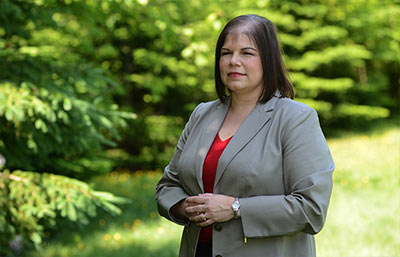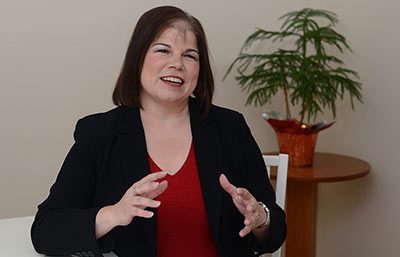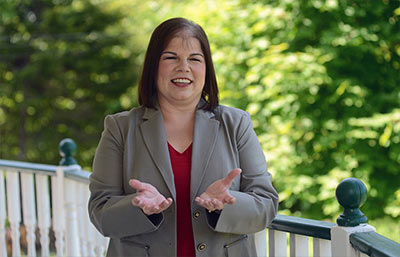
Making a mark on the global stage
Asia is becoming the centre of world economic development and emerging as a global powerhouse. So it’s no coincidence that the theme of the Confederation of Asian and Pacific Accountants’ (CAPA) conference last year was Asian Accountants: Leading the Way, Inspiring the Future.
Coincidentally, Jackie Poirier, FCPA, FCGA, is now leading the way. The Canadian CPA took over the leadership of CAPA at the conference and is charged with ensuring that CAPA continues to lead the accountancy profession in the Asia-Pacific region. CAPA — which has 32 member organizations (CPA Canada is one of them) in 23 member countries — is one of the largest of four regional organizations recognized by the International Federation of Accountants (IFAC). CAPA stretches from Pakistan to Canada.
Poirier is the first female president in the organization’s 39-year history. She talked to Member News about her role within CAPA and how Canadian CPAs influence decisions beyond the Canadian border.
When did your involvement with CAPA start?

I’ve always been interested in different cultures and the idea of travelling to new places. Back in university, I lived in one of the residences that housed all the international students from Africa, Asia and the Caribbean. I’ll never forget the excitement of some of those students experiencing their first snowfall.
My involvement with the international profession started with chairing a task force for CGA-Canada, which was set up to review the sustainability of CGA operations in Asia and the Caribbean. After that, as chair of CGA-Canada, I visited our international affiliates and worked with them closely to ensure their views were represented.
When my term on the CGA-Canada Board was ending in 2007, I indicated an interest in volunteering to represent CGA-Canada at CAPA and the board selected me as the delegate. After the unification of the Canadian profession, CPA Canada felt it was important to continue involvement with CAPA and they supported my ongoing involvement first as deputy president and then as president.
How has your Canadian experience helped?
The Canadian accounting profession is very well regarded internationally. It’s existed for well over a hundred years so we have a lot of experience to share, particularly with accounting bodies that are developing.
Canadian international delegates have a reputation for working well with others, being good listeners and being able to share their experience and best practices in a humble way. Over the years, Canadian representatives involved in CAPA have served the organization well and have given a lot. The board expects the same of me.
During my term on the CAPA board, I chaired the newly formed Professional Accounting Organization Development Committee and really focused on inclusiveness and engaging participants. Among other things, we developed a maturity model that professional accounting organizations (PAOs) can use to self-assess their stage of development and develop action plans for areas in which they wish to improve.
During development of the model, my technical advisor, Lyle Handfield (now vice-president, International — Asia, of CPA Canada and a CAPA board member) and I shared a lot of information about practices used in Canada. Other countries also shared their experiences.
I also bring an understanding of the challenges faced by small organizations that have limited resources. I gained that understanding through my involvement with CGA Nova Scotia many years ago, my involvement with the CGA-Canada board and my exposure to large and small professional organizations across Canada. It helps that I’ve lived in Atlantic Canada.
Many PAOs start out very small and have limited resources. I know what it’s like to be in this situation. I can draw from my experience in partnering with other organizations, leveraging volunteer resources and looking for creative solutions to resource challenges.
How are you applying your global experience to your role at the Canada Revenue Agency?

My international experience has strengthened my pride in being Canadian and being part of Canada’s public service where I’m director of the Nova Scotia Tax Service Office of the Canada Revenue Agency (CRA). While I have deeply appreciated my travels to various parts of the Asia-Pacific region, I’m keenly aware that others do not have the same quality of life we have and that some public sectors are really struggling.
Since CAPA meetings are often held in conjunction with some sort of learning event, I’ve been able to bring this learning to my role at the CRA. Many topics are related to accounting and professional standards. But more and more there are topics and discussions related to international taxation largely due to the profession’s role in providing technical input to the OECD ’s Action Plan on Base Erosion and Profit Shifting (BEPS).
Our CRA office celebrates Asian Heritage Month every May, so I’m always excited to share my latest travel and cultural experiences.
Why is it important for the Canadian CPA to be recognized globally?
Going global means that the accounting profession in your home country is part of a much larger accounting profession worldwide. As organizations and citizens participate more in the global economy, accountants need to broaden their view to be relevant and provide leadership. It doesn’t matter whether that’s in public practice, industry, government, academia or the non-profit sector. The workforce is becoming more mobile and taking on more roles in the international arena. Workers need the necessary skills.
What does being part of an influential global brand mean to CPAs?
A Canadian CPA should be proud to be part of the Canadian accounting profession, which is highly respected and recognized on the international stage. Representatives from CPA Canada participate in and play leadership roles in IFAC, the GAA (Global Accounting Alliance), CAPA and other organizations where they contribute to the development and strength of the international profession. CPA Canada is among the world’s largest professional accounting bodies and has a lot of influence on the international stage.
When you say you’re a Canadian CPA, those you’re dealing with know they’re dealing with a strong partner who has valuable expertise. Being a CPA opens doors in Canada as well as internationally. New CPAs should know that some of the brightest and most inspiring people across the globe are part of the accounting profession. I’ve met a lot of amazing, talented people. By choosing the accounting profession, you’re in great company.
What are some of the challenges you’ve experienced working in the global space?

Probably the greatest challenge is keeping everything in balance: family, work and volunteer responsibilities. Due to travel time, attending a two- or three-day CAPA meeting is really a week-long commitment.
Fortunately, I have a great support network at home and in the office.
The CAPA staff is excellent and it’s really their role to keep the operation going. The chief executive of CAPA [Brian Blood] is located in Sydney, Australia, and the Secretariat Office is in Kuala Lumpur, Malaysia, so time differences really work in our favour. Their workday is beginning when mine is ending.
Early on I was a bit apprehensive about travelling to some locations on my own, but I’ve become much more comfortable with that. Wherever we meet, the local accounting body is a tremendous host.
Editor's Note
The next issue of Member News will land in your inbox on August 8, 2016.
Enjoy the issue and, as always, let us know what you think!